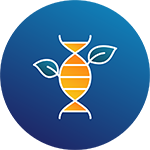
Botany
The Scientific Study of Plants
Plants are essential to our lives. They provide – either directly or indirectly – all of our food and the oxygen we breathe. They are a source of important medicines (aspirin developed due to the study of rotting tree bark, and penicillin came from mold). They are the foundation of all terrestrial communities and, as such, have a dramatic impact on the world’s climate, the global cycles of nutrients and water, and the daily lives of every living creature.
Botany – sometimes referred to as plant science, plant biology, or phytology – is the study of all aspects of the biology of plants, including their structure, properties, and biochemical processes. The importance of the field of botany cannot be overstated, as botanical research has resulted in an increased and improved supply of medicines, foods, fibers, building materials, and other plant products. In addition, conservationists use botanical knowledge to help manage rangelands, forests, parks, and wilderness areas. And environmental protection and public health professionals depend on their understanding of plant science to help solve society’s most pressing pollution problems.[1]
Botany is such a broad field of study that it is helpful to break it down into areas of specialization.[2][3][4]
Branches of Plant Biology
Anatomy
Plant anatomy is the study of the internal structure (cells and tissues) of the plant.
Biochemistry
Plant biochemistry is the study of the chemical aspects of plant life processes, including the chemical products of plants (phytochemistry).
Biophysics
Biophysics involves the application of physics to plant life processes.
Cytology
Plant cytology is the structure, function, and life history of plant cells.
Ecology
The ecology branch of botany studies the relationships between plants and the world in which they live, both individually and in communities. Included in this branch is the study of adaptations of plants with reference to their environment and the study of soil erosion, soil conservation, and pollution.
Genetics
Genetics is the study of heredity and variation. Botanists that specialize in plant genetics study genes and gene function in plants.
Histology
Plant histology is the study of microscopic plant cells and tissues.
Morphology
Plant morphology is the study of the macroscopic form and structure of plants. Morphologists also study the evolution and development of leaves, roots, and stems.
Paleobotany
Paleobotany is the study of extinct plants or fossilized plants recovered from geological strata. Plant fossils provide us with key insights into evolutionary milestones and past environments.
Physiology
Plant physiology is the study of every aspect of a plant’s internal functioning – those physical and chemical processes necessary for life as it manifests itself in a plant. It includes the study of interactions of photosynthesis at the molecular level and internal diffusion of water, minerals, and nutrients as well as the processes of plant development, seasonality, dormancy, and reproductive control.[5]
Systematics
The primary goal of plant systematics is to reconstruct the evolutionary history of plant life and the relationships among plants.
Taxonomy
Taxonomy is the science of discovering, naming, and describing the species diversity on our planet. Plant taxonomy is the branch of botany that classifies plants according to their characteristics and interrelationships.
Applied Plant Sciences
Agronomy
Agronomy is the study of field crop production and soil management. Agronomists make practical use of plant and soil sciences to increase the yield of field crops.
Biotechnology
Biotechnology uses biological organisms to produce useful products. Plant biotechnology involves inserting desirable genes into plants and having those genes expressed.
Plant Breeding
Plant breeding is the development of better varieties of plants. Plant breeding involves selecting and crossing plants with desirable traits such as disease resistance.
Economic Botany
Economic botany is the study of plants with reference to their products (e.g., medicines, gums, oils, fibers, fuel, wood etc.). Economic botany includes the study of which plants and plant products are harmful and beneficial.
Food Science and Technology
Food Science and technology involves the development of food from various plant products.
Forestry
Forestry involves the management of forest for the production of timber, and conservation.
Horticulture
Horticulture is the production of ornamental plants and fruit and vegetable crops.
Plant Pathology
Plant Pathology studies the different types of plant diseases, their symptoms, causes and methods of control.
Plant Types
Bryology
Bryology is the study of mosses, liverworts, and hornworts.
Lichenology
Lichenology is the study of lichens, symbiotic organisms composed of a fungus and a photosynthesizing partner.
Mycology
Mycology is the study of fungi. Fungi have a tremendous impact on the biosphere as they help recycle dead organic material.
Pteridology
Pteridology is the study of ferns and similar plants.
Phycology
Phycology is a branch of biology that is concerned with the scientific study of algae, the primary photosynthetic organisms in freshwater and marine food chains.
…
Citations
- Botanist, Purdue University College of Science.
- Areas of Specialty in Botany, Botanical Society of America.
- Branches of Botany, Teaching Science.
- Introduction to Botany, Environmental Science.
- Study of Plant Physiology, Its Aims and Economic Application, International Journal of Engineering Science Invention (IJESI), ISSN (Online): 2319-6734, ISSN (Print): 2319-6726, www.ijesi.org ||Volume 9 Issue 12 Series II || December 2020 || PP 64-66.

The Path to Becoming a Botanist
From High School to Your First Job
Build a Solid Academic Foundation
Basics:
Take all available STEM-related courses (biology, physics, chemistry, computer science, mathematics) offered at your high school. Take all these classes at the most advanced level possible (honors, AP). This will help you to learn to think critically, problem-solve, and build your knowledge base.
Recommended:
If not available at your high school, try and take botany or botany-related (forestry, conservation, ecology, or environmental science) courses. In addition, it is advisable to take other biology-related courses, such as microbiology and biochemistry as well as advanced mathematics courses like statistics.
Keep in Mind:
Try and get work experience through a research internship or summer program. Learn how to write for a technical and non-technical audience. The ability to communicate clearly in writing cannot be overstated. Spend time learning the basics, and the more complex concepts will follow naturally.
Dive In!
And become an expert
![]()
Puruse our library of must-read books
![]()
Thumb through a scientific publication
Take an online course
![]()
Watch an interesting video
![]()
Check out these great websites
Get a

jump on your Academic career
There’s no substitute for experience.
We have compiled a database of thousands of internships, research opportunities, academic programs and specialized training programs so you can get a jump on your academic career.
Internships
Research
Academic Training Programs
And if you need support to fulfill your dreams and ambitions, our searchable database has plenty of scholarship opportunities as well as programs designed to increase diversity in the sciences.
Scholarships
Diversity, Equity & Inclusion
Need Help Finding Your Opportunity?
Our video tutorials explain the ins and outs of landing a great internship, research project or training program.
Make all the right moves
Advice from those who know
Maintain an excellent GPA, especially in the sciences
Try and get an internship at a lab outside of your university labs
Have some work experience on your resume
Spend time in the lab and master basic lab techniques
Attend professional conferences and botany seminars
Present your research at student research colloquiums
Build experience through internships or as an undergraduate researcher
Join professional societies and organizations
Stay current by reading professional and scientific journals
Learn about current research projects
What degree is right for you?

Bachelor’s Degree
A bachelor’s degree is the minimum requirement to work in the field of botany. If you do not attend a school with a specific botany or plant science major, you should obtain a degree in a related area (biology, biochemistry, microbiology, ecology) and add coursework in botany, plant taxonomy, and systematics. Familiarity with fieldwork techniques and the use of scientific instrumentation is essential.
Master’s Degree
A master’s degree is recommended as this is where you will be able to specialize your studies in botany or plant science. Obtaining your master’s degree will also result in better employment opportunities at the state and federal levels as well as in the private sector. If your undergraduate degree was not specifically in botany or plant science, then a master’s degree may be required to obtain a mid-level position and for future advancement.
Doctoral Degree
10 Schools With Excellent Botany Programs
Want to see the full list of colleges and universities with degree offerings or relevant courses?
Botany
University of Florida
Botany
University of Wisconsin-Madison
Plant Biology
North Carolina State University
Botany
Cal Poly Humbolt
Botany
University of Hawaiʻi at Mānoa
Botany
North Dakota State University
Botany
Ohio Wesleyan University
Botany
Oregon State University
Plant Biology
University of Vermont
Botany
University of Maine
![]()
Tip 1
While both the B.S. and B.A. degrees will provide you with a strong background in botany, the B.S. degree requires more math, chemistry, and physics and is the choice of most students who want to pursue a science-based career.
![]()
Tip 2
Many colleges require a core program in biology before you may enroll in specialized botany courses. You should get a broad general education in arts, humanities, and the social sciences in addition to specializing in botany.
![]()
Tip 3
You should arrange to do an undergraduate research project or internship under one of your professors. This experience will not only bolster your resume but also help you decide which area or areas of botany you like best.
Have familiarity with one or more of the following areas

Field survey and analytical techniques

Plant physiology

Computer modeling

Genetics

Geographic Information Systems

Plant identification

Specimen and sample processing

Conservation

Plant taxonomy

Ecosystem restoration
Typical Job Functions of a Botanist
Here are some of the interesting things you could be doing.
Finding new ways to produce enough nutritious food for a growing world population.
Identifying new species.
Developing sustainable cropping practices.
Studying plants, their environments, relationships, traits, and processes.
Conducting fieldwork, collecting and testing plant samples, and recording observations.
Investigating the impact of environmental factors on plant life.
Investigating new methods to fight plant diseases.
Restoring damaged ecosystems.
Conserving species, through plant collections in gardens and arboretums, for future generations.
Bioengineering plant DNA.
There’s an Ocean of Possibilities
The study of botany aims to expand and increase our current knowledge about plants in order to solve problems in many fields, including agriculture, ecology, and horticulture. Because of the great diversity in the plant sciences, people with many different backgrounds, abilities, and interests can find a satisfying career in botany. New positions in botany are expected to increase at an above-average rate as the growing world population continues to increase the need for better food supplies. In addition, environmental concerns, such as air, water, and soil pollution, will create openings for ecologists in government and industry.
Common employers include:
Federal and State Agencies
- U.S. Department of Agriculture
- U.S. Forest Service
- U.S. National Park Service
- U.S. Department of the Interior
- U.S. Bureau of Land Management
- U.S. Geological Survey
- U.S. Environmental Protection Agency
- Smithsonian Institution
- National Aeronautics and Space Administration
- State Parks
- Environmental Regulatory Agencies
- Biotechnical Regulatory Agencies
Educational Institutions
- Colleges
- Universities
- Community Colleges
- High Schools
- Plant Research Centers
Industry
- Ecological Consulting Companies
- Petrochemical Companies
- Chemical Companies
- Lumber Companies
- Paper Companies
- Pharmaceutical Companies
- Food Companies
- Seed Companies
- Nurseries
- Fruit Growers
- Biological Supply Houses
- Biotechnology Firms
- Science Communication Firms
Non-Profits
- Museums
- Botanical Gardens
- Arboretums
- Zoos
Start your career search with our extensive list of employment websites.
